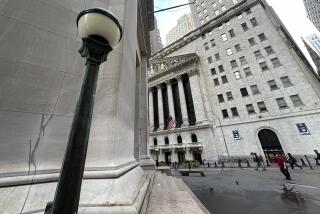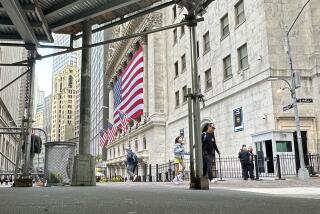FINANCIAL MARKETS : Short-Term Rates Leap; Dow Gains : Market Overview
- Share via
Short-term interest rates surged on a report that the Federal Reserve stands ready to raise interest rates to check inflation. But long-term bond yields eased.
* Blue chip stocks shot higher in the closing minutes of trading, pushed up by selective buying in a handful of big name stocks, such as IBM and AT&T.;
* Gold had a volatile day, ending lower in New York after rallying in Europe and Asia.
Credit
Interest rates on short-term Treasury bills hit their highest levels since January, as investors responded to new talk of tighter credit at the Federal Reserve.
The average discount rate on newly auctioned six-month T-bills shot to 3.19% from 3.10% a week ago. The new rate was the highest since 3.28% at the Jan. 4 auction.
Just four weeks ago, the six-month bill rate was 2.95%.
The Wall Street Journal reported Monday that the Fed agreed at its closed-door meeting last week to lean toward tighter credit to try to dampen recent signs of resurgent inflation.
While the Fed isn’t expected to take any overt steps to raise short-term rates soon, the mere belief that the central bank could act is enough to effectively cause tighter credit, economists note. In other words, investors are demanding higher rates on short-term securities as a precaution against a Fed move in that direction.
However, analysts don’t expect short-term rates to rise much more, unless inflation indicators show new strength.
Meanwhile, yields on long-term bonds actually fell Monday even as short-term rates rose.
Traders said the Fed’s apparent willingness to fight inflation gave bond owners more comfort. Inflation is the No. 1 enemy of long-term bonds, because it erodes the value of the fixed returns that the bonds pay.
The yield on the 30-year Treasury bond edged down to 7.00% from 7.04% late Friday. The bond’s yield has been rising steadily in recent weeks as inflation worries have mounted.
“The report that the Fed has tilted its policy . . . has helped reassure the markets that the Fed would be willing, if need be, to keep inflation in check,” said Douglas Schindewolf, economist at Smith, Barney, Harris Upham & Co.
Stocks
Stocks again showed resilience despite interest-rate turmoil.
The Dow Jones industrials, which fell 30.45 points Friday in futures-related trading, gained 14.95 points to 3,507.78 on a wave of late buying.
Declining issues were about even with advancers on the New York Stock Exchange, though volume slid to 196.73 million shares.
“Despite the concerns about inflation and interest rates, there’s a touch of optimism about the economy and the stock market,” said Hugh Johnson, chief investment officer at First Albany Corp.
Analysts said investors overall are more eager to find reasons to buy stocks than to sell. Rather than take their cue from rising short-term interest rates on Monday, for example, stock investors appeared to focus on declining long-term rates.
While rising inflation has worried Wall Street, higher prices are associated with a stronger economy--which should ultimately be good for corporate profits.
Several waves of computerized buy programs lifted the Dow, adding about 7 points to the index in the last 10 minutes of trading.
Among the market highlights:
* Technology stocks, leaders in the recent rally, surged again on optimism about continuing high demand for computers.
IBM gained 1 3/8 to 49 3/4, Hewlett-Packard jumped 2 to 85 5/8, Motorola advanced 2 1/4 to 80 1/8, Texas Instruments rose 1 3/8 to 65 5/8, Computer Associates gained 1/2 to 29 1/4, and Rexon added 7/8 to 5 3/8.
* Many industrial stocks also renewed their advance. Goodrich rose 2 to 47 1/2, Illinois Tool Works added 1 to 72, Dow Chemical gained 1 1/2 to 56, Variety jumped 3/4 to 31, and Deere zoomed 2 1/4 to 61 1/8. Deere is expected to report strong quarterly earnings today.
* Telecommunications and cable TV stocks, big winners last week, rose further. AT&T; jumped 1 3/8 to 60 1/2, Tele-Communications soared 1 1/4 to 21 7/8, Jones Intercable gained 5/8 to 13, and General Instrument rose 1 to 39 1/4.
Also, QVC Network leaped 2 7/8 to 65 1/4. The home-shopping network said a new sales program with Saks Fifth Avenue “exceeded expectations” in its first run on Saturday.
* On the downside, food stocks suffered after cereal giant Kellogg said its current-quarter earnings will be about 10% below year-earlier results. The firm also said that “achieving double-digit growth (in 1993) will be challenging.” It blamed slower overseas business. Kellogg slumped 2 3/4 to 53 7/8.
Analysts noted that Kellogg is just the latest in a long string of consumer-product companies that have lost sales and earnings momentum in the ‘90s.
Among other foods stocks, General Mills fell 2 to 67 after announcing a corporate cost-cutting plan. Elsewhere, Heinz slid 7/8 to 37 3/8, Ralston Purina lost 1 1/4 to 46, and Quaker Oats dropped 1 1/8 to 72 1/2.
Overseas, Frankfurt’s DAX average shed 7.50 points to 1,603.09. London’s FTSE-100 index gained 13.4 points to 2,825.6.
In Tokyo, the Nikkei average eased 81.31 points to 20,476.16.
Other Markets
A rise in short-term interest rates helped stall the gold rally.
After surging overseas, gold for current delivery sank $3.60 an ounce to $373.90 on New York’s Comex. Silver also dropped, losing 13.4 cents to $4.54 an ounce.
Analysts attributed the seesaw in gold prices mostly to technical maneuvering rather to a change in investors’ attitude toward gold. Many experts believe that gold’s rally will continue.
Elsewhere, light, sweet crude oil for July fell 16 cents on the New York Merc to $19.72 a barrel.
In currency trading, the dollar gained as short-term interest rates jumped. In New York, the dollar rose to 110.60 Japanese yen, up from Friday’s 110.35, and to 1.637 German marks, up from 1.627.
Market Roundup, D10
More to Read
Inside the business of entertainment
The Wide Shot brings you news, analysis and insights on everything from streaming wars to production — and what it all means for the future.
You may occasionally receive promotional content from the Los Angeles Times.










